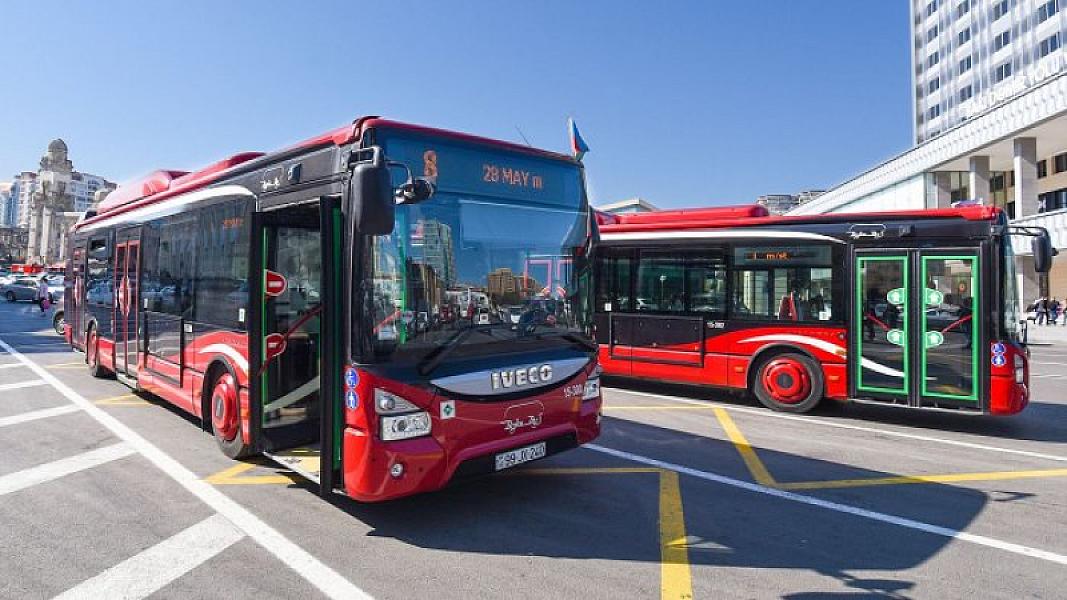In accordance with the "State Program for Improvement of Transport Infrastructure in Baku City and Surrounding Areas for 2025–2030," measures in the field of public transport are being implemented in phases.
Within the framework of the State Program, important work is being carried out on infrastructure renewal, construction of new metro stations, procurement of new wagons and electric buses, development of garages, depots, energy supply, and electric charging infrastructure serving wagons and buses.
To continuously maintain the quality of public transport services at a high level and to form a sustainable financing mechanism for the renovation of the bus fleet, recently a decree on some measures to improve the field of regular passenger transportation by automobile transport was signed by the head of state, which will accelerate the renewal of the bus fleet and the provision of quality passenger transportation services.
Bus
Currently, private transport companies continue to import modern buses that use environmentally friendly technologies, namely electricity or compressed natural gas. In accordance with the State Program, both Baku and various regions of the country are being equipped with new buses.
In Ganja city, the entire bus fleet has been renewed. At the newly opened bus depot in recent days, there are 244 modern and comfortable vehicles used in the city’s route network. By the end of 2025, this number will be increased to 280.
During 2025, nearly 100 environmentally friendly buses have been involved in transportation in the capital, and by the end of the year, this number will reach 400.
The renewal process has also covered Sumgait city and the Absheron district—85 modern buses have been put into service for passengers.
Additionally, by the end of the year, 60 electric buses will be brought to Nakhchivan.
This process is also underway in territories liberated from occupation. According to the "Great Return" plan, priority will be given to providing electric transport vehicles to the cities of Lachin, Khankendi, Jabrayil, and Aghdam. These transport vehicles are already being brought to the country, and a special depot is being prepared for them.
Overall, within the scope of the work carried out, it is planned to put into operation 143 electric buses for intra-city and intra-district routes in the liberated territories by the end of 2026, and 19 electric buses for inter-city (inter-district) transportation.
Metro
Within the framework of the State Program, important steps are being taken to expand the capital’s metro system. Currently, the design work for 10 new stations is nearing completion. According to the corresponding plan, the construction of these stations is scheduled to be completed and put into operation within the stipulated timeframe. One new station is planned to be opened to passengers in 2026.
Consistent measures are also being taken to renew the metro wagon fleet. Recently, 65 new wagons have been purchased, 35 of which have already been put into operation. The remaining 30 wagons are planned to be put into passenger service within the current year. By 2030, it is planned to purchase and launch an additional 299 new generation wagons on the metro lines.
Decision
At a time when there is a need to provide higher quality service in public transport, a relevant decision was made on the regulation of tariffs to ensure the continuity of passenger transportation services and to achieve the goals set in the state program, and new tariffs were approved:
The tariff for passenger transportation by metro is 60 qapik per trip;
The minimum tariffs (varying by distance) for passenger transportation services on regular intra-city (intra-district), inter-settlement, and suburban bus routes that meet modern requirements and operate only via cashless payment instruments are set at 60 qapik;
These tariffs will come into force from October 1, 2025.
The new tariffs for urban, suburban, and inter-settlement bus routes within the administrative territory of Baku city will apply only to buses operating via cashless payment instruments and powered by electricity or compressed natural gas (CNG).
This change will initially cover approximately 30% of the existing route network in the capital that meets these requirements. There will be no price changes for routes that do not meet the requirements.
At the same time, tariff changes will also apply to regular bus routes operating between Baku-Sumgait, Baku-Absheron, Sumgait-Absheron, and other cities and districts. This change will apply to trips paid only via cashless payment instruments, and to buses powered by electricity, CNG, or diesel fuel produced after January 1, 2025.
The tariff change will positively impact increasing carriers’ financial stability, accelerating the renewal of the bus fleet (approximately 400 new buses are expected to be purchased and put into service annually in the coming years), providing payment convenience for the population, promoting the use of environmentally friendly buses, and increasing transparency in passenger transportation.
Additionally, carriers’ transition to cashless payment systems will be stimulated, and on this basis, conditions will be created to form technical capabilities for the application of differential tariffs in passenger transportation.

